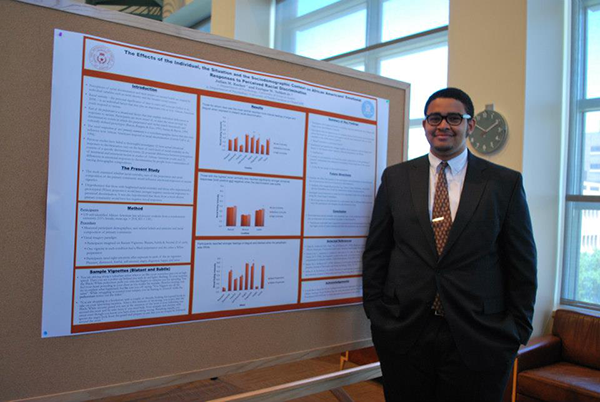Psychology alum credits program for interest in research, pursuing doctorate.
The Summer Undergraduate Research Experience (SURE) is a summer internship program for undergraduate students interested in research in psychology. The program, which particularly encourages students from traditionally underrepresented groups to apply, provides hands-on training that will make students more competitive for top doctoral training programs.
Recent SURE participant and UT-Austin graduate Julian Rucker reflects on his experiences with the program as he prepares to apply to Ph.D. programs in social and developmental psychology.
A last-minute phone call altered the professional path that one UT-Austin psychology student would take.
A native of Columbia, Md., Julian Rucker was preparing to head back home to look for a job for the summer after initially being turned down by the SURE program due to program funding constraints. As he was about to leave, the program contacted him and offered him a recently opened spot. It was perhaps the most influential moment in his academic career.
“Like many undergraduate psychology majors, I was initially interested in becoming a therapist and didn’t have much interest in doing research,” Julian said. “My career aspirations and life goals shifted dramatically because of my participation in SURE. I learned how fulfilling research can be, especially when you’re examining questions in which you are deeply interested.”
In his work with SURE, Julian split his time between three labs: Mood Disorders, where he conducted diagnostic phone interviews for a treatment study on Major Depressive Disorder; the Laboratory for the Study of Anxiety Disorders, where he worked on a study for Post-Traumatic Stress Disorder and cared for animals used in exposure therapy; and the Gender and Racial Attitudes Lab, where he recruited and ran participants for a study examining how children’s career aspirations are shaped by the representation of their gender in a profession.
UT psychology professor Christopher Beevers, who oversaw Julian in his work in the Mood Disorders lab, detailed the tasks Julian was assigned, as well as the way in which he completed them.
“He conducted clinical interviews, followed study protocols and had an important role in data collection and processing.” Beevers said. “He was also a really nice presence in the lab. He’s an easygoing guy with a great sense of humor. People just liked being around Julian.”
Lab work wasn’t the only component of the program that influenced Julian’s life. SURE students also attend seminars, which discuss the different career options available to them in psychology and related fields. Participants also receive instruction on writing a personal statement, formatting CVs, the proper way to contact professors via email and how to research graduate programs.
“The program gave me advice that I would not have received in my normal coursework as a psychology major,” Julian said. “Beyond making the process of applying to graduate school much more clear, the experiences I had in SURE showed me why I should want to get a Ph.D.”
Julian’s wish for the SURE program is an expansion to make it more inclusive, allowing more students to be exposed to the opportunities that he was.
“I was very fortunate to receive this opportunity, but I was also very close to not receiving it,” Julian said. “I understand how different my path may have been if that fourth person had decided to participate. There are obviously financial constraints to expanding the program, but if the goal is to increase the representation of underrepresented groups in psychology, efforts need to extend much further.”
His sentiments were echoed by Professor Beevers, who emphasized the importance of the program.
“Increasing diversity within academia is a tremendously important long-term goal,” he said. “Programs like SURE are critical for helping us, as a field, accomplish this goal.”
A year after SURE, Julian was selected into a similar program at the University of North Carolina at Chapel Hill called the Moore Undergraduate Research Apprenticeship Program (MURAP) with the help of recommendations from his SURE mentors. His work at MURAP was later presented at the meeting of the Society of Research in Child Development, and subsequently published in a peer-reviewed journal. Julian credits his experiences at SURE as making these opportunities possible.
Julian is now as a research associate at Indiana University’s Department of Psychological and Brain Sciences, where he manages multiple research projects for the Mind & Identity in Context Lab with Dr. Mary Murphy. He is currently preparing to apply to doctoral programs in social and developmental psychology.
